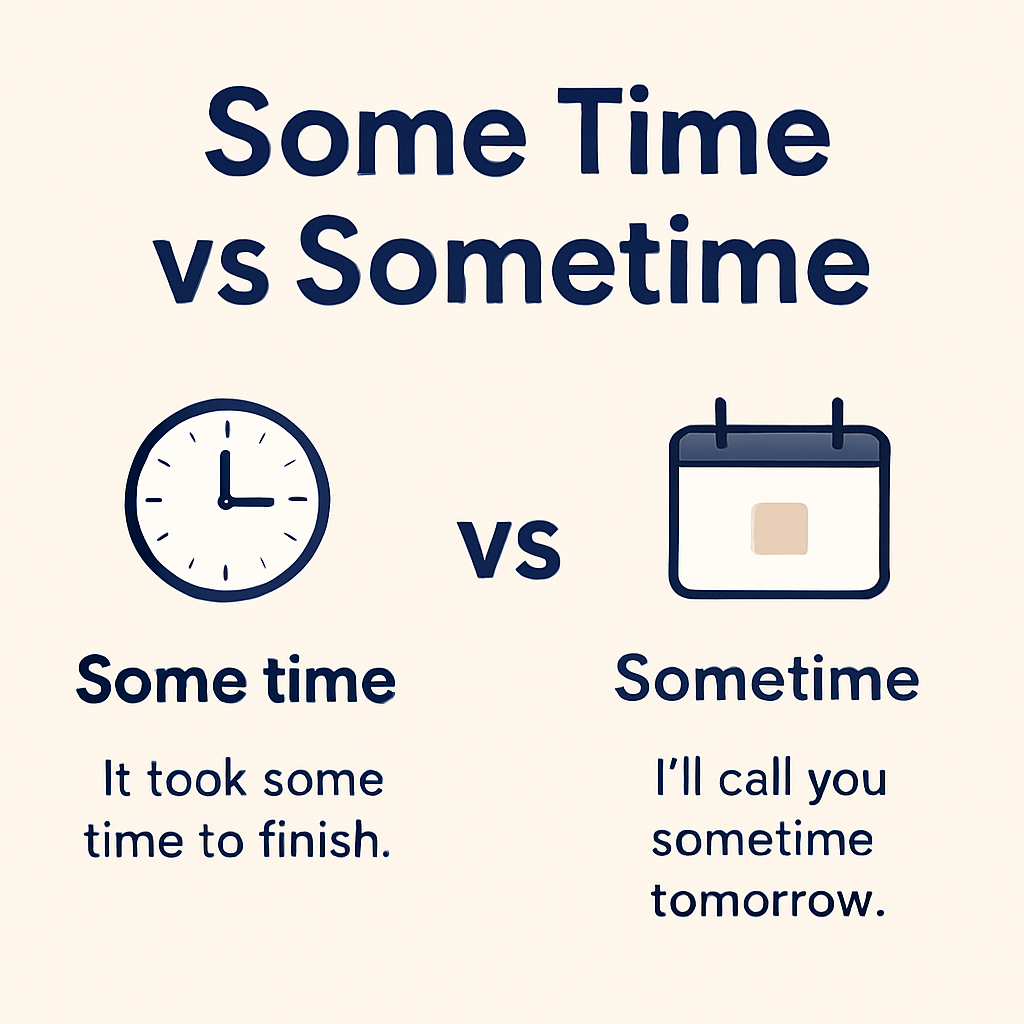Some Time vs Sometime

English is full of word pairs that cause confusion, and some time vs sometime is a classic example. At first glance, they look almost identical yet they serve very different purposes in writing. Using the wrong one can change the meaning of your sentence or make it unclear.
So, what’s the difference between some time and sometime? In short:
- Some time (two words) means a period of time or duration.
- Sometime (one word) means an unspecified point in time.
This article will break down the grammar behind some time vs sometime, share real-life examples, highlight common mistakes, and offer memory tips to help you choose the correct one confidently.
Grammatical Differences of Some Time and Sometime
To understand some time or sometime, let’s break down the grammar:
- Some time is a noun phrase:
- “Some” = determiner
- “Time” = noun
Use it when you mean a duration or amount of time.
Example: We’ll need some time to get ready.
- Sometime is an adverb:
Use it when you mean at an unspecified point in the past or future.
Example: Let’s meet sometime next week.
Summary:
- Use some time when you’re talking about how long something takes.
- Use sometime when you’re referring to when something happens, but don’t specify when.
Real-Life Examples of Some Time vs Sometime
Correct Use of “Some Time” (two words):
- He spent some time living abroad.
- I’ll need some time to think about it.
- They’re hoping to take some time off next month.
Correct Use of “Sometime” (one word):
- Let’s meet sometime next week.
- Sometime in the 1800s, the town was founded.
- She plans to visit Japan sometime soon.
Incorrect Examples:
- I’ll be ready in sometime. (Should be some time)
- We should go hiking some time next weekend. (Use sometime)
In all these examples, choosing the correct version in the some time vs sometime debate changes the meaning entirely.
Common Mistakes with Some Time vs Sometime
A typical mistake is using sometime (one word) when you actually mean a duration:
I need sometime to relax.
I need some time to relax.
Or, using some time when you really mean eventually:
Let’s hang out some time next month.
Let’s hang out sometime next month.
Another common issue is inconsistent use, especially in emails or blog posts, where the words are accidentally swapped or miswritten. Staying aware of the difference between some time and sometime helps you avoid these pitfalls.
Memory Tips for Using Some Time and Sometime Correctly
Here’s how to never confuse some time or sometime again:
- Some time = a period of time
Tip: If you can replace it with “a little time,” use some time.
“I need a little time” = “I need some time.” - Sometime = at some unknown point in time
Tip: One word = one vague time.
“Let’s meet sometime” = “Let’s meet eventually.”
Quick Check:
- Talking about how long? → Use some time
- Talking about when (without being specific)? → Use sometime
Once you get used to this, the some time and sometime decision becomes second nature.
Conclusion: Choosing Between Some Time vs Sometime
To sum it up:
- Use some time (two words) when referring to duration.
- Use sometime (one word) when referring to an unspecified time.
Remember, both are correct but only in the right context. Paying attention to these differences in some time vs sometime will instantly improve your writing clarity. Still struggling with tricky word pairs? Check out our guide on It vs It’s to sharpen your skills even further.
Want to dive deeper into confusing time expressions? Check out this helpful Cambridge Dictionary guide.